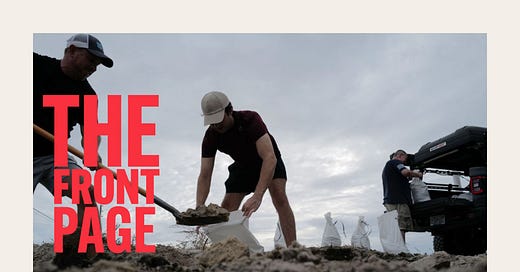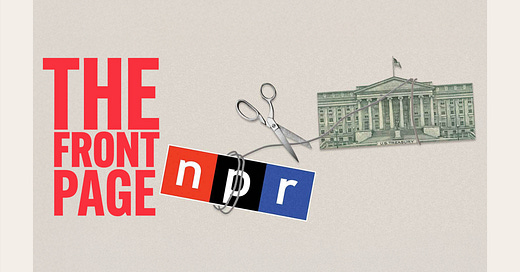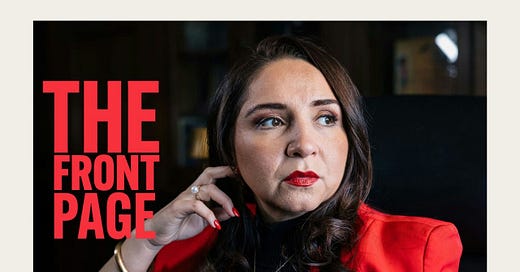
The Free Press

It’s Wednesday, October 9. This is The Front Page, your daily window into the world of The Free Press—and our take on the world at large. First, the fallout at CBS News over a tough interview continues today.
On Monday, we reported that CBS Mornings co-anchor Tony Dokoupil was admonished by senior executives for failing to meet CBS “editorial standards” in an interview with best-selling author Ta-Nehisi Coates about his new book, The Message, which features a one-sided anti-Israel polemic. We also published a recording of part of that October 7 meeting, in which CBS’s bigwigs hung Dokoupil out to dry.
Our reporting was picked up everywhere—even The New York Times had to acknowledge the scoop—and two days later it’s still not clear what Dokoupil did wrong, other than ask tough but substantive questions.
In our world, we call that journalism.
But the fallout over the sin of Dokoupil’s questions continued on Tuesday morning during a meeting for the morning show staff.
Originally, CBS News had invited a self-described “mental health expert, DEI strategist, and trauma trainer” named Dr. Donald Grant to moderate a conversation on the issue in an all-staff meeting on Tuesday. That plan was scrapped after old social media posts from Dr. Grant surfaced—including one where he referred to South Carolina senator Tim Scott as “Uncle Tim” (a reference to “Uncle Tom”) and another of him describing a possible second Trump term as “MAGAcide” and the “death of a nation.” Seems like just the guy you should call when you want to smooth things over. (A source close to the drama told The Free Press that the network was “humiliated by his Instagram.”)
The meeting went ahead without Grant—staffers were not able to join from outside of CBS offices in order to prevent leaks. One source familiar with the proceedings suggested it was a “shit show,” with various employees “yelling.” Shawna Thomas, the show’s executive producer, was in tears. So was Dokoupil.
There was an open debate in the meeting about whether it is “fair to talk about whether Israel should exist at all.” There are some people at CBS who think that “Israel’s existence as a state should be part of fair conversation,” said one CBS source. Can you imagine journalists having that conversation about any other country?
No wonder Shari Redstone, the controlling shareholder of CBS’s parent company Paramount Global—at least until its merger with Skydance goes through some time next year—is not happy. A source close to Redstone told The Free Press that Redstone thought that “Tony gave a great interview and modeled what civil discourse should look like. And she disagreed with the action the company took. She’s working with the CEOs to address this issue.”
Meanwhile, Coates himself spoke about the controversy for the first time Tuesday. In a trailer for an appearance on Trevor Noah’s podcast, he accused Dokoupil of “commandeering” the interview. “I don’t think he did Nate and Gayle a service, and I’m really, really sorry for them,” said Coates, referring to Dokoupil’s co-hosts Gayle King and Nate Burleson.
But Coates also revealed a detail that caught our eye. As he was praising King as a “great journalist and a great interviewer,” he said that “Gayle came behind the stage before we went [on] and she had gone through the book, and I’m not saying she agreed with the book. She was like, ‘I’m gonna ask you about this. I’m gonna ask you about that.’ ”
So let’s get this straight: One journalist is raked over the coals for asking tough questions, while another journalist—if Coates’s recollection is correct—previews her questions and faces no repercussions. (King did not respond to a request for comment.)
Which poses a few questions. Chief among them: Are there different rules for different journalists at CBS?
A former CBS journalist told The Free Press that “If she was showing him specific lines of questioning in advance, that would violate journalistic standards. Now are they going to investigate her and say that what she did was not in keeping with CBS standards? I suspect not.”
One last thing: Let’s just say we have pattern recognition around stories like these. So when two sources at CBS told The Free Press that this whole dustup involved the network’s “Race and Culture Unit,” we weren’t shocked.
According to the company’s website, this unit works “in concert with the CBS News Standards and Ethics department to ensure all stories have the proper context, tone, and intention.” It was formed in the summer of 2020. “We must always be aware of how race and culture impacts our journalism—and, in terms of the future of CBS News, this unit will be as important as Standards and Practices,” a CBS executive said at the time.
“These broad and subjective criteria have made them a very powerful voice and many employees believe this has allowed greater bias to creep into editorial decisions at the network,” said one CBS News source to The Free Press. “You see bias when it’s something you don’t agree with.”
“My Relatives Live in the Path of Hurricane Milton. They Refuse to Evacuate.”
“You are going to die.” That was the stark warning Tampa mayor Jane Castor gave to those living in the mandatory evacuation zones of Hurricane Milton, which is expected to bring storm surge of up to 15 feet when it makes landfall later today. The only option to survive, in other words, is to leave.
But River Page, our reporter based in Pensacola, Florida, says he understands why many decide to stay.
“I didn’t evacuate when Hurricane Sally barreled toward my home in Pensacola in 2020. As the storm raged and I waded through ankle-deep water in my apartment, assessing the damage and with nowhere else to go, I could hear a crowd of neighbors playing country music upstairs. After the winds subsided and I started to sweep the water out the front door, one of them popped down to offer my husband and me a beer. Like many others in the city, they were having a hurricane party—a phenomenon, exactly what it sounds like, that is so widespread in the Southeast, particularly in Florida, that it has its own Wikipedia page.”
But it’s not just the stubborn or the adventurous who stay put. “Many people can’t leave,” especially given the extortionate cost of hotels and flights.
This week, River’s in-laws, who live in Milton’s path in coastal Pasco County, told him they’re staying put—even though he’s urged them to take shelter at his place safely outside the evacuation zone. Click here to read why some Floridians take pride in staying put in the face of a storm.
Will the Supreme Court Deal a Devastating Blow to the Death Penalty?
The Supreme Court—often derided by progressives as a bastion of far-right extremists—will soon deal a devastating blow to the death penalty.
The court is scheduled to hear oral arguments in the case of Oklahoma death row inmate Richard Glossip today, and either way they rule, their decision will rock national attitudes toward capital punishment.
If the court rules in favor of Glossip, it will be acknowledging that a grave injustice has taken place, raising questions over the guilt of anyone on death row. But if the court decides against him, and Oklahoma moves forward with his execution—even though almost every powerful Republican in the state opposes it—the call to end capital punishment in the state will only grow.
“No matter which side of the Glossip case the Supreme Court ultimately agrees with, state leaders will be forced to answer why Oklahoma has insisted on executing a man without considering new and potentially exculpatory evidence,” Brett Farley, the executive director of Catholic Conference of Oklahoma, which opposes the death penalty, told The Free Press. “It’s simply indefensible.”
Back in January, Rupa Subramanya profiled Glossip, who has spent the past 25 years in solitary confinement and has been scheduled to die nine times. Read her report on his latest twist of fate, “Will the Supreme Court Save Richard Glossip?”
In Episode Four of Raising Parents, Emily Oster Asks: Are We Overmedicating Kids?
Kids and teens today are more diagnosed than ever, across the board, whether it’s a medical disorder like ADHD or a mental health condition like obsessive-compulsive disorder. Say you’re 15 and you’re worried about that upcoming algebra test? Anxiety. You’re 12 and you weren’t invited to that birthday party? Depression. Scared to ride your bike again after that little fall last summer? PTSD. And these diagnoses are accompanied by a menu of medications that purport to fix your child.
Today: What’s behind the rise in diagnoses—both for ADHD, mostly among young boys, and for anxiety and depression, mostly among teen girls? Are they really the most distracted, anxious, and depressed generation ever to exist? Or are we, perhaps, pathologizing what used to be considered normal feelings and behaviors—and as a result, diagnosing and overmedicating kids for. . . acting like kids? And what are the long-term effects of having millions of boys on speed and millions of girls on SSRIs?
Click play below, or subscribe wherever you get your podcasts, to listen to Emily Oster unpack all this and more.
Bad news: The U.S. budget deficit for the 2024 fiscal year exceeded $1.8 trillion according to estimates from the Congressional Budget Office. It’s an especially weighty sum given the national debt is already nearly $36 trillion. What’s worse is that both Donald Trump and Kamala Harris promise to be big spenders, which will see the U.S. hemorrhage trillions more dollars over the next decade.
Good news: Philadelphia saw fewer homicides in September than any other month over the last nine years, according to new analysis of police data by The Philadelphia Inquirer. From 2020 through 2022, the city saw an average of 44 killings a month and many worried the city was spiraling out of control. But that figure halved this year to a monthly average of 21 homicides. And last month it halved again to ten homicides. Some of the most violent districts have seen as much as a 70 percent drop in homicides compared to three years ago.
Relatedly, George Gascón, the progressive district attorney of Los Angeles, is floundering behind his challenger, Nathan Hochman, who has a 30-point lead in the polls. “People do not feel as safe as they did before George Gascón took office and they want a DA who will prosecute crime, restore balance, and improve public safety,” Hochman told the L.A. Times.
Kamala Harris has worked hard to position herself as the change candidate this election—which is a little awkward given that she is the sitting vice president of the United States. But her promise to “turn the page” looks especially absurd in light of her appearance on The View yesterday. She was asked if she would have done anything differently than Biden over the last four years. And her answer was nothing if not (uncharacteristically) clear: “There is not a thing that comes to mind, and I’ve been part of most of the decisions that have had impact.”
In Switzerland, assisted suicide is allowed under certain protocols, but a new dystopian technology has run into legal trouble. Once inside the “Sarco capsule,” a person reclines and pushes a button to release nitrogen gas, rendering them unconscious and suffocating them in a matter of minutes. But applications to die this way—which numbered 371 last month—have been suspended pending a criminal investigation into the death of the pod’s first user, a 64-year-old American woman who died on September 23. The Swiss Health Minister said that the Sarco “does not fulfill the demands of the product safety law.” It’s unclear to us what product safety laws should look like when the product in question is designed to kill.
Floridians will vote this November on whether to amend their state’s constitution to include a right to abortion any time before fetal viability (generally around 24 weeks of pregnancy) or any time after when deemed necessary by a healthcare provider. To pass, a ballot initiative in the Sunshine State needs at least 60 percent of the vote. But recent polling shows the measure is on track to fail: Only 46 percent support the initiative, 38 percent oppose it, and 16 percent remain undecided or refused to answer. (Intriguingly, the latter category were twice as likely to support Trump than Harris.) And for Democrats hoping that abortion might bring Florida back into play in the presidential race, the poll made for dismal reading: It puts Trump 13 points ahead.
Osama bin Laden’s son Omar bin Laden, who moved to France in 2016 and apparently developed a passion for painting, was recently banned from entering the country. The ban was handed down by a government whose interior minister vowed to “fight political Islam,” following Omar’s posts on X honoring the twelfth anniversary of his father’s death. The posts violated France’s law against “commenting favorably” on terrorism, but may have had a warmer reception among the American youth who’ve expressed admiration for bin Laden’s prose.
And finally. . . River Page thought he’d hate Will Ferrell’s new Netflix documentary, in which the actor travels across the country with his newly out trans best friend. But instead he found it “surprisingly moving.” Read his full review of Will & Harper, a deeply human documentary almost ruined by its producers.
Bari Weiss is the founder and editor of The Free Press. Oliver Wiseman is an editor and writer for The Free Press.
To support honest, independent journalism, become a Free Press subscriber today:





















CBS is just standing by anti racist doctrine which states that blacks can't be racist and anyone who notices they are is a racist..
I’m a liberal and I was so hopeful that the 2020 struggle sessions we had to go through in many large corporations were behind it. And they are, the vast majority of Americans have moved on and many corporate executives are a lot less inclined to entertain the fringe views of some junior associates.
Except in media, it would seem. It’s especially disheartening to see this at CBS, which had a reputation for being the most news-focused of the big networks and was one of the last ones to enjoy bipartisan viewership. It’s easy to disparage them and stop watching but where does this leave us? My team has my echo chamber, your team has your echo chamber? How do we live together if we are so divided that there’s hardly any shared news both sides trust. It’s a grim outlook.